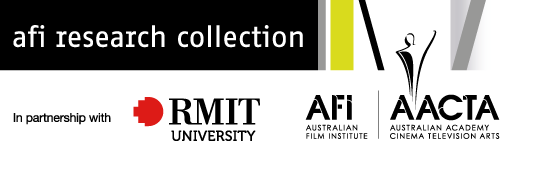[England]: Palgrave Macmillan, 2018.
Call No: 62 DOU
Author: Doughty, Ruth; Etherington-Wright, Christine
Edition: Second edition
Source: UK
Place: [England]
Publisher: Palgrave Macmillan
PubDate: 2018
PhysDes: xiv, 325 pages : illustrations ; 26 cm
Subject: FILM; THEORY; AUTEUR THEORY; ADAPTATIONS; GENRES; FORMALISM; MOVEMENTS AND STYLES IN FILM HISTORY; MOVEMENTS IN FILM HISTORY; STRUCTURALISM; MARXISM AND THE CINEMA; REALISM IN FILMS; POSTMODERNISM AND THE CINEMA; PSYCHOANALYSIS AND THE CINEMA; FEMINISM AND THE CINEMA; MASCULINITY IN FILMS; HOMOSEXUALITY AND THE CINEMA; HOMOSEXUALITY IN FILMS; RACIAL ISSUES AND THE CINEMA; POSTCOLONIALISM AND THE CINEMA; TRANSNATIONAL CINEMA; STARS; AUDIENCE RESEARCH; AUDIENCE RECEPTION; HUNGER GAMES, THE (US, Gary Ross, 2012); RUN LOLA RUN (G, Tom Tykwer, 1998); LOLA RENNT (G, Tom Tykwer, 1998); ONCE UPON A TIME IN THE WEST (IT/FR, Sergio Leone, 1968)
SEE
C`ERA UNA VOLTA IL WEST; LEGO MOVIE, THE (US/AT/DK, Phil Lord and Christopher Miller, 2014); ACT OF KILLING, THE (DK/NO/UK, Joshua Oppenheimer, (2012); MOULIN ROUGE (AT/US, Baz Luhrmann, 2001); OLDBOY (KO, Park Chan-wook, 2003); OLDEUBOI (KO, Park Chan-wook, 2003); FROZEN (US, Chris Buck & Jennifer Lee, 2013); BLUE IS THE WARMEST COLOR (FR/BE/SP, Abdellatif Kechiche, 2013); DJANGO UNCHAINED (US, Quentin Tarantino, 2012); AVATAR (US, James Cameron, 2009)
Summary: -- "Film theory has a reputation for being challenging. Often requiring time and effort to fully grasp it and seeming rather old-fashioned, it can be difficult to approach the subject with enthusiasm and appreciate its relevance to modern day.
Understanding Film Theory aims to disassociate theory from these connotations and bring a fresh, contemporary and accessible approach to the discipline. Now comprehensively updated in a second edition, the book’s sixteen chapters - including a new chapter on Adaptations - continue to provide an insight into the main areas of debate. Taking the application of theory as its central theme, the text incorporates a number of innovative features: ‘Reflect and Respond’ sections encourage readers to engage critically with theoretical concepts, while seminal texts are concisely summarised without oversimplifying key points.
Throughout the book the authors illustrate why theory is important and demonstrate how it can be applied in a meaningful way, with relevant case studies drawn from both classic and contemporary cinema including: Once Upon a Time in the West (1968), Run Lola Run (1998), The Hunger Games (2012), Blue is the Warmest Colour (2013) and The Lego Movie (2014). Additional case studies address key genres (the British Gangster film and the musical), film movements (Dogme 95), individual actors (Ryan Gosling, Judi Dench and Amitabh Bachchan) and directors (Alfred Hitchcock and Guillermo del Toro).
Understanding Film Theory is an approachable and extensive introduction to film theory. It is the ideal entry point for any student studying film, using clear definitions and explaining complex ideas succinctly. " -- BOOK BACK COVER
Notes: Includes index; Includes bibliographical references, filmography and index
ISBN: 9781137528230
Contents: -- List of illustrations -- Acknowledgements -- Introduction -- 1 Auteur Theory
Case study: Alfred Hitchcock -- Case study: Guillermo del Toro -- 2 Adaptations
Case study: The Hunger Games (Gary Ross, 2012) -- 3 Genre Theory -- Case study: The British Gangster Film -- Case study: The Musical -- 4 Formalism
Case study: Lola Rennt/Run Lola Run (Tom Tykwer, 1998) -- 5 Structuralism and Post-Structuralism -- Case study: Once Upon a Time in the West (Sergio Leone, 1968) -- 6 Marxism -- Case study: The Lego Movie (Phil Lord & Christopher Miller, 2014) -- 7 Realism -- Case study: Dogme 95 -- Case study: The Act of Killing (Joshua Oppenheimer, 2012) -- 8 Postmodernism -- Case study: Moulin Rouge! (Baz Luhrmann, 2001) -- 9 Psychoanalysis -- Case study: Oldboy (Chan-Wook Park, 2003) -- 10 Feminism -- Case study: Frozen (Chris Buck and Jennifer Lee, 2013) -- 11 Masculinity -- Case study: Ryan Gosling -- 12 Queer Theory -- Case study: Blue is the Warmest Colour (Abdellatif Kechiche, 2013) -- 13 Race and Ethnicity -- Case study: Django Unchained (Quentin Tarantino, 2012) -- 14 Postcolonial and Transnational Cinemas -- Case study: Avatar (James Cameron, 2009) -- 15 Stars -- Case study: Amitabh Bachchan -- Case study: Dame Judi Dench -- 16 Audience -- Research and Reception -- Case study: Tartan Video -- Conclusion -- filmography -- Index --

